Board
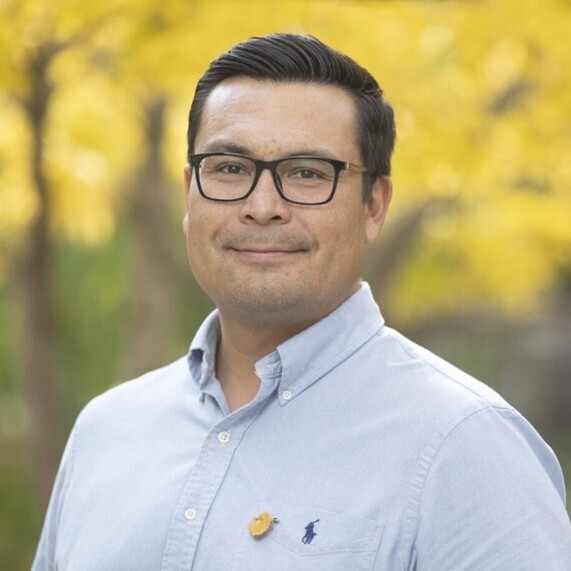
Ian Worme
President
Tansi,
Ian Worme is a band member with Kawacatoose First Nation in Treaty 4. He is a proud father of two beautiful daughters and community member to Whitecap Dakota Nation where his wife is from.
Ian’s background is in education and policy. In 2010, he earned a Bachelor of Education through the Indian Teacher Education Program and in 2021 received a Master of Public Administration through Johnson Shoyama Graduate School of Public Policy. Ian has over 13 years’ experience within the field of education as a teacher, liaison, student advisor, consultant, and manager. He has worked in both public and separate school divisions, on reserve and in the Ministry of Education.
Ian currently works at the University of Saskatchewan in the College of Graduate and Postdoctoral Studies as the Indigenous Initiatives Coordinator and as a Sessional Lecturer instructing Indigenous Business in Canada at Edwards School of Business.
Ian enjoys spending his time with his daughters on the land engaging with nature by picking traditional medicines, plants, hunting, fishing, camping, and canoeing, and ensuring his daughters are active within and proud of their Dakota Nehiyaw culture and heritage.
Close

Jennifer Fitzpatrick
Vice President
Jennifer Fitzpatrick has been passionately involved in arts, culture, and heritage in the province throughout her 30+ year career. She started as a summer student at the Humboldt Museum and has led the organization since 1989. She is currently the Director of Cultural Services for the City of Humboldt; in that capacity, she manages the civic museum in a designated 1912 heritage building. She led the expansion of the organization by rehabilitating a 1920s bank building into a community public art gallery that opened in 2014. Jennifer’s focus has always been community narratives, and this respect and dedication led to the development of a prairie field into the Original Humboldt site, which is an 80-acre parcel of land with public archaeology, art installations, trails, and space to share multiple narratives of history.
Jennifer believes that heritage shapes our contemporary stories, whether on the land at Original Humboldt or through the historic Water Tower, which has been re-adapted with an internal staircase into a unique tourist attraction that offers the best view of the city. Jennifer celebrates the connection between culture and commerce as an active member of the Humboldt Downtown Business Improvement District, and in cultural planning at the municipal level. She is proud to be part of a community network creating partnerships for projects around Reconciliation. Jennifer’s passion includes Public Art, and the 2022 mural with artist Kevin PeeAce (in collaboration with local youth) was a testament to the connection of heritage, art, community, and moving forward in Reconciliation. She is currently part of the team working on Heritage Saskatchewan’s pilot program in Humboldt, “Relationship Building and Reconciliation through Living Heritage” in partnership with the Office of the Treaty Commissioner and Aboriginal Friendship Centres.
The lines between work and play are usually blurred for Jennifer, as her volunteer roles have included wonderful learning experiences serving the cultural sector. Aside from involvement in the Humboldt Area Arts Council and other local groups, she has been involved in provincial and national organizations, including as a board member of the Creative Cities Network of Canada, Organization of Saskatchewan Arts Councils, Museums Association of Saskatchewan, and the Saskatchewan Heritage Foundation. She has served on committees and juries for the Canadian Museums Association, SaskCulture, Heritage Saskatchewan, Tourism Saskatchewan, and the Saskatchewan Council of Archives & Archivists.
Jennifer is the author of 100 Interesting Stories about Humboldt, published in 2005. She has a degree in Anthropology from the University of Saskatchewan and a Diploma in Cultural Resource Management from the University of Victoria. She was awarded the Queen Elizabeth II Diamond Jubilee Medal in 2012 for her work in heritage and cultural activity, and the Platinum Medal in 2022 for contributions to the province for public service.
Jennifer’s diverse range of experiences in the cultural sector is a quest for continual learning to help support community sense of place, identity, and cultural understanding. She is excited to have the opportunity to continue that learning in serving Heritage Saskatchewan members.
Close

Erin Folk
Past President
Erin is a veteran of the Royal Canadian Mounted Police. She was born and raised in rural southern Saskatchewan in a mixed farming/ranching pioneer family. Erin learned an appreciation for culture and heritage through a close relationship with her grandmother, who taught her many aspects of the family’s cultural background.
Erin also learned to appreciate the Indigenous history of Saskatchewan through a close relationship with the land she grew up on. There were many forays into the prairie on exploration missions, where she encountered and learned to cherish the signs and sites of Indigenous occupation and way of life on the prairies.
Erin is currently engaged in work that champions the improvement of diversity and inclusion. As a province with a multifaceted array of beautiful cultures and heritage, Saskatchewan needs to be on the forefront of acceptance and encouragement for diversity. Erin works hard every day to help achieve this vision.
Erin is a member of three Boards, including one she incorporated as a non-profit for her own community in an effort to bring residents together to address common concerns and provide a viable future for the community. She upholds governance principles, and understands the importance of policy adherence, as well as flexibility and respect in management.
Erin is happy to use her knowledge, skills and experience to continue to support the Heritage Saskatchewan Board of Directors in the coming years, and looks forward to working with the Board for a second 2-year term.
Close

Stephanie Danyluk
Director
With over fifteen years of experience in the heritage sector, Stephanie is dedicated to advancing discussions and advocacy related to heritage. Her experience spans public history and commemoration, research, and community engagement, with a particular focus in the area of supporting Indigenous self-determination in heritage spaces. Stephanie hold a Master’s degree in History from the University of Saskatchewan.
In her current role as Senior Manager of Community Engagement & Indigenous Initiatives at the Canadian Museums Association, she supports efforts related to the Truth and Reconciliation Call to Action #67, contributing as researcher and co-author to the "Moved to Action" report, which was developed under the advisory of Indigenous heritage professionals. Additionally, she develop programs and resources at a national level to support museums and the heritage sector ensure compliance with the United Nations Declaration on the Rights of Indigenous Peoples (UNDRIP). Her responsibilities include relationship-building with national Indigenous heritage professionals and organizations, advocacy for repatriation, and professional development support for the sector. In previous roles, such as Senior Analyst at the Whitecap Dakota First Nation, she has contributed to public history projects and educational initiatives, as well as claims research and negotiations.
As a committed advocate for history and heritage, Stephanie has served a number of terms as a Director for Saskatchewan History and Folklore, including as Chair of the Community Engagement Committee and Vice President. She also served as a Director for the McDowell Foundation, which supports research related to teaching and learning within Saskatchewan.
Stephanie’s diverse experiences have equipped her with the skills to contribute to Heritage Saskatchewan’s vision and mission, providing her with understanding of the past and its value for shaping our dynamic and complex present. She is an experienced advocate for our diverse heritage sector and looks forward to opportunities to further foster positive relationships between communities and organizations, as well as at a governance level.
Close
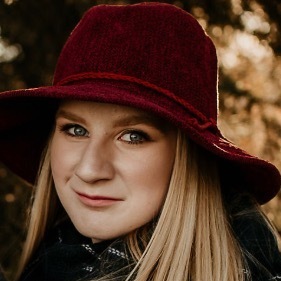
Paige Hundt
Director
Paige Hundt’s interest in heritage was introduced during her time as a summer student with Parks Canada. Throughout this formative time in her life, Paige travelled across Saskatchewan and learned from many different people about the lands in which she lives. She currently works in municipal land development and land use planning in Northwest Saskatchewan, where she is able to work on a variety of different projects. She prioritizes the preservation of heritage assets and making informed decisions to achieve sustainability. Paige’s heritage portfolio also includes her volunteer work as a current board member for her hometown museum. She believes that her past and current work will help guide her in her position as a Director with Heritage Saskatchewan and is looking forward to gaining more insight.
Paige also prioritizes working with and learning from Indigenous partners as a better way to understand Saskatchewan’s history. She is a firm believer that the best way to engage our communities is to engage with them and learn from the lived experiences of those around us. Through her approach to develop, expand, and sustain relationships, Paige was able to host the first annual National Indigenous People’s Day celebration within the Town of Battleford. This was a monumental day within the Town and region with a tipi being erected in front of Town Hall. She strives to continue learning from Indigenous partners and continue this tradition in other communities.
When Paige is not at work, she can be found spending time with her husband, doing home renovation projects, and planning her next road trip. Her favourite annual tradition is travelling to various historic sites to learn about heritage preservation and presentation across other provinces. In doing so, Paige is able to bring ideas back to Saskatchewan to be proposed and applied in the province. She is looking forward to being able to apply the knowledge gained from these adventures into her role with Heritage Saskatchewan.
Paige is excited to be working with Heritage Saskatchewan to expand her knowledge, build relationships, and contribute to further growth of heritage initiatives within the province.
Close

Timothy Panas
Director
Tim’s professional background in the fields of heritage conservation and outreach, education, cultural resource management, and non-profit governance is extensive, encompassing over 25 years and obtained from organizations and institutions from across Canada and the United States. As a professional, his primary area of interest has been the archaeology of western North America with a focus on the pre- and post-European contact periods of the Canadian prairies. In pursuing these interests, he has completed a PhD in Interdisciplinary Studies from the University of Saskatchewan, examining Indigenous perceptions and usage of dune environments on the Northern Plains, and a Master’s degree from the University of Montana, for which he conducted excavations at a Métis river lot near Fort Saskatchewan, Alberta.
Since the beginning of his career, he has continually been active in organizations that have strived to protect and promote heritage resources through education, outreach, as well as fostering research and awareness. As both an undergraduate and graduate student, he has been involved with several university departments to engage the public through fieldwork, public talks, and campus events to promote the discipline of anthropology and to foster an increased awareness of the contributions of heritage professionals to the workplace and society. Since arriving in Saskatchewan in 2007 he has been extremely active within the heritage community through his employment and volunteer work with non-profit agencies. As a paid professional, Tim has worked with numerous organizations, including the Royal Saskatchewan Museum, professional consulting firms, and for the Prince Albert Historical Society. For the latter, he was employed as a curator in their museum system where, under the guidance of their volunteer board, he oversaw all aspects of operation for the four museums and one archive under their care. Duties in this position included the management of human resources, the creation of exhibits focusing on multiple periods of Prince Albert history, outreach programming development and delivery, external relations, budget development, and collaborating with board members and stakeholders in strategic planning for the organization. Currently, Tim is engaged with Parks Canada as a Communications Officer, where he is responsible for drafting communications products for the regional field unit, including filming agreements, social media content, and site management plans. As well, he is acting as an archaeological advisor with a research project based out of the First Nations University of Canada that is working with First Nations communities in northern Saskatchewan to combine traditional knowledge with archaeological data on artifacts and sites on their respective reserves. Tim’s experience within the non-profit field includes a tenure as a Member at Large with the Saskatchewan Archaeological Society, as well as his ongoing role as a Director with the Saskatoon Archaeological Society. As a member of both boards, he has played roles in the development of policy, operations, and outreach while under the group’s respective mandates.
As a Director for Heritage Saskatchewan, Tim brings extensive experience in working with a board and staff in developing the governance policies needed to oversee the successful operation of a heritage organization within Saskatchewan. With over two decades of experience in the heritage field, as well as his time working within board-overseen organizations, he makes a valuable contribution to Heritage Saskatchewan in meeting their mandates of promoting research in the province, facilitating community resilience, and offering all who reside in the province with a strong and communal sense of place.
Close
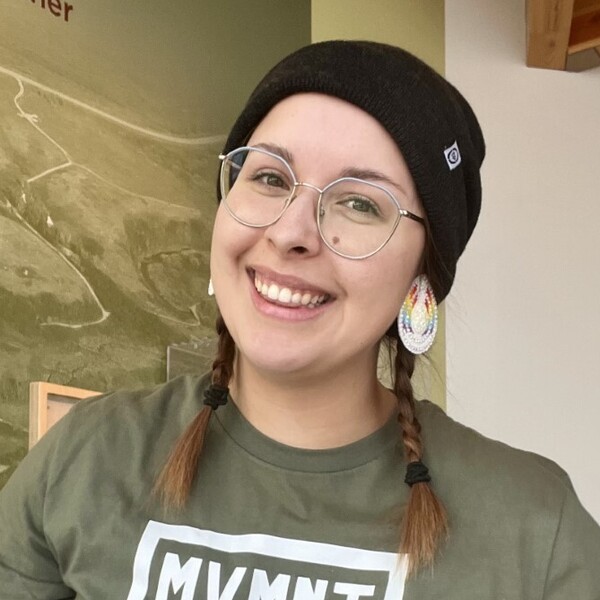
Bailey Pelletier
Director
Bailey Pelletier is a proud Nehiyaw woman from Cowessess First Nation located in Treaty 4. She holds a Bachelor of Science (Honours) in Archaeology from the University of Saskatchewan and she is continuing her education by pursuing a M.A. in Archaeology under the supervisor of Dr. Ernest Walker. Her research includes cultural material from the Wolf Willow site, which is located in the Opimihaw Valley of Wanuskewin Heritage Park. She took her first field school in 2018 and excavated at the same Wolf Willow site that she works on today. It was from there her love of archaeology, history, and heritage grew. She became one of the archaeological tour guides at the park the following summer (2019) and found a deeper love of not only learning of the past but of sharing and educating others on the same topics.
In the summer of 2020, Bailey went on to work for the Saskatchewan Archaeological Society (SAS) as a summer student and helped excavate at the Farr site, furthering her knowledge and experience within Saskatchewan history. She worked for the SAS again in the summer of 2022, helping with excavations out at Fort Carlton. Along with excavating, she has also assisted with many of the public outreach events the SAS participate in, educating the public on Saskatchewan’s history and heritage.
Bailey has also been apart of a team for ground penetrating radar (GPR) work at various locations in Saskatchewan. The work her and the team have done in particular has received international spotlight and was featured in a short documentary by the NY Times, along with a filmed “60-minute” segment with Anderson Cooper in 2021. While this work is heavy, it still is apart of Saskatchewan’s (and Canada’s) history and she believes that it is important to acknowledge and inform the public on topics such as residential schools so that we may all heal and reconcile together.
Close
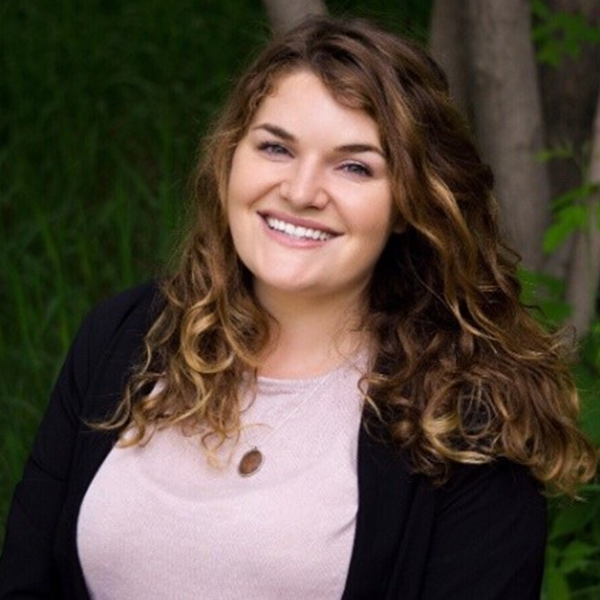
Haven Rees
Director
Haven is a lifelong resident of Saskatchewan, originally from the RM of Fertile Valley, and has always had a keen interest in various categories of heritage, including the built, natural, and cultural aspects that are unique to the province. Her interest in heritage was first kindled by involvement in a restoration project of a building originally built in 1912. She was further interested in cultural heritage through her participation in western and Métis fiddle culture, which is a unique style of music specific to western Canada.
Haven has since gone on to pursue an undergraduate degree in Regional and Urban Planning as well as a Masters degree in Public Policy from the Johnson-Shoyama Graduate School of Public Policy. Both educational experiences have granted her a solid foundation in community-based policy-making and an indepth knowledge of organisational decision-making and governance models. Her professional experiences have encouraged an interest in pursuing heritage-relate projects.
Several work appointments and contract positions have included work that is complementary to the existing work of Heritage Saskatchewan. Her current position with the City of Saskatoon’s Planning & Development department supports the city’s Civic Heritage Policy and administers municipal heritage property designations.
Haven’s volunteer efforts have also complemented her interest in heritage, with her most relevant experiences including involvement with the Canadian Commission for UNESCO. Haven has been selected as a member for the Youth Advisory Committee for CCUNESCO for two consecutive terms beginning in 2016; has held positions of Chair and Vice-Chair within the Steering Committee for this group; and has participated in many initiatives with the organisation including review of publications for the Coalition of Inclusive Municipalities.
Haven looks forward to contributing to the Heritage Saskatchewan Board and the advancement of heritage work within this province and beyond.
Close

John Richards
Director
Born and raised in Saskatchewan, John obtained his bachelor of Applied Science in electronics systems engineering from the University of Regina. Since graduating, John has worked as an electrical design engineer at Ritenburg & Associates Ltd. John provides electrical consulting services around Saskatchewan and works with many different groups and shareholders providing expertise in buildings electrical services. Throughout John’s career, he has been able to work with numerous communities to provide structures that are used by the public from water treatment plants to schools and community centres, which will be a part of the community for years to come.
Throughout John’s career, he has had the opportunity to be involved in the restoration of various structures around Saskatchewan, including the historical Darke Hall. In John’s experiences with building design, he has gathered a large appreciation for historical structures and the meaning that can be held within. The Darke Hall restoration provided John with the experience of heritage structures and the unique challenges with providing a building with all the luxuries of modern times, while maintaining the original structure and services. Heritage structures have a large number of shareholders as each and every person in Saskatchewan is a part of the history and is in charge of maintaining it.
In John’s spare time, he enjoys sports and has volunteered as a coach with Hockey Regina and still plays hockey each year. John enjoys spending time outdoors through hunting or hiking in the many lands Saskatchewan has to offer. John’s favourite spots include the prairies and wetlands of Southern Saskatchewan, while also taking an annual trip to the boreal forest in Northern Saskatchewan. Through the time spent in nature, John interacts with many heritage items Saskatchewan has to offer, from the natural wildlife and plant life, to the relics of past farming equipment and Indigenous historical sites.
John looks forward to being able to volunteer on the board of Heritage Saskatchewan and is excited to be a part of the preservation of heritage in Saskatchewan.
Close
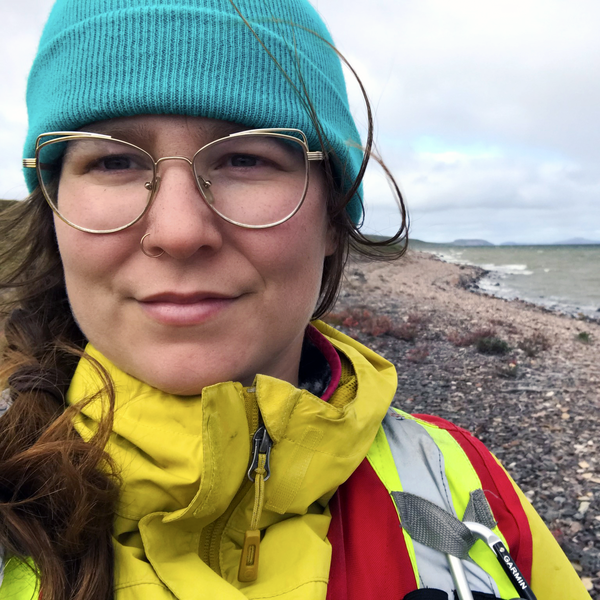
Jennifer Rychlo
Director
Having worked as a professional Archaeologist in Saskatchewan for over eight years, Jennifer Rychlo has a deep appreciation for our province’s heritage resources and extensive knowledge regarding heritage management and conservation on multiple levels.
Jennifer graduated from the University of Saskatchewan with a B.A. (Hons) degree in Archaeology in 2013 and entered the M.A. program in Archaeology that same year. In 2016, she successfully defended her thesis, which was titled “The Camp Rayner Site: Terminal/Late Paleoindian and Early Middle Period Transitions on the Northern Plains”. Her thesis explored the deepest cultural layers of the Camp Rayner Site (EgNr-2), which is located on the shores of Lake Diefenbaker, Saskatchewan, and contains over 7,000 years of Precontact cultural history. In addition to this, she also created a Resource Management Plan for the Camp Rayner site, which detailed the current and potential impacts to the site and provided recommendations to aid in its long-term preservation and protection.
In 2013 and 2016, Jennifer was employed by the Saskatchewan Archaeological Society (SAS) as a summer student, assisting with the public field school excavations at South Branch House, a historic fur trade fort site, and the Farr Site, a 10,000-year-old bison-butchering site located in southeast Saskatchewan. Additionally, she assisted the SAS with numerous public outreach events, educating both children and adults about Saskatchewan’s heritage and history. In 2014, she was employed by Golder Associates Ltd., initially working as a part-time archaeological field technician during the summer months and eventually gaining full time employment as a permit-holding archaeologist in 2018. Through her work, Jennifer has had the opportunity to travel much of Saskatchewan, exploring the many natural and cultural resources the province has to offer.
In addition to her employment as an archaeologist over the years, Jennifer has also volunteered for numerous heritage societies, including the Saskatchewan Archaeological Society, the Saskatoon Archaeological Society, the Canadian Archaeological Association, Heritage Saskatchewan, and the Saskatchewan Association of Professional Archaeologists. From 2015 to 2020, she was the Vice President of the Saskatoon Archaeological Society; since 2019, she has been the President of the Saskatchewan Association of Professional Archaeologists. She is also a current Board Member of the Saskatchewan Archaeological Society.
Through her work as a consultant archaeologist and her time volunteering for multiple heritage societies, Jennifer feels that she can bring a unique perspective to Heritage Saskatchewan’s Board of Directors. Not only is she well acquainted with Saskatchewan’s history and cultural heritage, but she is also familiar with the province’s regulatory agencies and heritage management processes. She fully believes in the essential role of heritage, both tangible and intangible, in our society, and she has made it her life’s work to support the protection and preservation of this important resource in our province.
Close
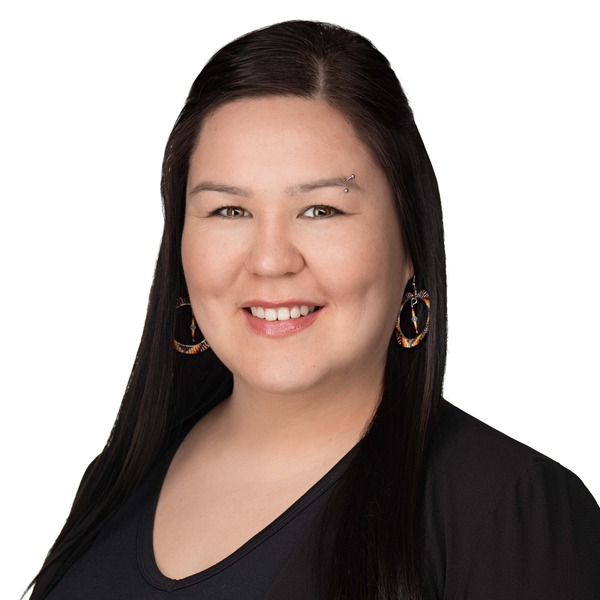
Ranelle Sylvestre
Director
Ranelle Sylvestre is proud member of Clearwater River Dene Nation on Treaty 8 territory in Northwest Saskatchewan, and resides on the Metis Settlement of La Loche. Ranelle holds a Bachelor of Education Degree from University of Regina & First Nations University. With a special background in the Dene Language. With this degree, she can teach others how to speak, read and write in her first language.
She is currently employed with La Loche Friendship Centre as the Honouring Her Spark facilitator. If she is not at work, she is a full-time parent to her very athletic eleven-year-old daughter. She lives a healthy life style for her daughter to have a positive role model to look up to. If they are not at work or school, they are outdoors learning from the land. Going to the cabin, ice fishing or going for a cook out. Being out on the land is healing, its our way of life and survival, and she encourages her daughter and others to try to get out as much as possible.
Ranelle has volunteered her time to various boards within the community over the years that she has lived in La Loche. Through northern lights school division, Sport recreation and culture, and mostly with the La Loche Friendship Centre. She presents herself as a professional independent young leader. Since she started out with the LLFC, one day she decided she wanted to be at a level where she had a say in things when it comes to making decisions for the community. Since then, she has been blessed with many opportunities from different directions, and the leader in her has really grown. Ranelle strongly believes that language, culture and identity are very important for everyone to know and practice in life. Her childhood was mostly spent in Saskatoon and moving to the north has given her the best of both worlds. It has given her the skills and knowledge on how to survive in the western and nonwestern lifestyles. She dedicates her time to help others problem solve and be independent at any age. As a young Indigenous female, she strives to be an advocate for other young female leaders who want to make change and give back to their community.
Close

Ian Worme
President
Tansi,
Ian Worme is a band member with Kawacatoose First Nation in Treaty 4. He is a proud father of two beautiful daughters and community member to Whitecap Dakota Nation where his wife is from.
Ian’s background is in education and policy. In 2010, he earned a Bachelor of Education through the Indian Teacher Education Program and in 2021 received a Master of Public Administration through Johnson Shoyama Graduate School of Public Policy. Ian has over 13 years’ experience within the field of education as a teacher, liaison, student advisor, consultant, and manager. He has worked in both public and separate school divisions, on reserve and in the Ministry of Education.
Ian currently works at the University of Saskatchewan in the College of Graduate and Postdoctoral Studies as the Indigenous Initiatives Coordinator and as a Sessional Lecturer instructing Indigenous Business in Canada at Edwards School of Business.
Ian enjoys spending his time with his daughters on the land engaging with nature by picking traditional medicines, plants, hunting, fishing, camping, and canoeing, and ensuring his daughters are active within and proud of their Dakota Nehiyaw culture and heritage.

Jennifer Fitzpatrick
Vice President
Jennifer Fitzpatrick has been passionately involved in arts, culture, and heritage in the province throughout her 30+ year career. She started as a summer student at the Humboldt Museum and has led the organization since 1989. She is currently the Director of Cultural Services for the City of Humboldt; in that capacity, she manages the civic museum in a designated 1912 heritage building. She led the expansion of the organization by rehabilitating a 1920s bank building into a community public art gallery that opened in 2014. Jennifer’s focus has always been community narratives, and this respect and dedication led to the development of a prairie field into the Original Humboldt site, which is an 80-acre parcel of land with public archaeology, art installations, trails, and space to share multiple narratives of history.
Jennifer believes that heritage shapes our contemporary stories, whether on the land at Original Humboldt or through the historic Water Tower, which has been re-adapted with an internal staircase into a unique tourist attraction that offers the best view of the city. Jennifer celebrates the connection between culture and commerce as an active member of the Humboldt Downtown Business Improvement District, and in cultural planning at the municipal level. She is proud to be part of a community network creating partnerships for projects around Reconciliation. Jennifer’s passion includes Public Art, and the 2022 mural with artist Kevin PeeAce (in collaboration with local youth) was a testament to the connection of heritage, art, community, and moving forward in Reconciliation. She is currently part of the team working on Heritage Saskatchewan’s pilot program in Humboldt, “Relationship Building and Reconciliation through Living Heritage” in partnership with the Office of the Treaty Commissioner and Aboriginal Friendship Centres.
The lines between work and play are usually blurred for Jennifer, as her volunteer roles have included wonderful learning experiences serving the cultural sector. Aside from involvement in the Humboldt Area Arts Council and other local groups, she has been involved in provincial and national organizations, including as a board member of the Creative Cities Network of Canada, Organization of Saskatchewan Arts Councils, Museums Association of Saskatchewan, and the Saskatchewan Heritage Foundation. She has served on committees and juries for the Canadian Museums Association, SaskCulture, Heritage Saskatchewan, Tourism Saskatchewan, and the Saskatchewan Council of Archives & Archivists.
Jennifer is the author of 100 Interesting Stories about Humboldt, published in 2005. She has a degree in Anthropology from the University of Saskatchewan and a Diploma in Cultural Resource Management from the University of Victoria. She was awarded the Queen Elizabeth II Diamond Jubilee Medal in 2012 for her work in heritage and cultural activity, and the Platinum Medal in 2022 for contributions to the province for public service.
Jennifer’s diverse range of experiences in the cultural sector is a quest for continual learning to help support community sense of place, identity, and cultural understanding. She is excited to have the opportunity to continue that learning in serving Heritage Saskatchewan members.

Erin Folk
Past President
Erin is a veteran of the Royal Canadian Mounted Police. She was born and raised in rural southern Saskatchewan in a mixed farming/ranching pioneer family. Erin learned an appreciation for culture and heritage through a close relationship with her grandmother, who taught her many aspects of the family’s cultural background.
Erin also learned to appreciate the Indigenous history of Saskatchewan through a close relationship with the land she grew up on. There were many forays into the prairie on exploration missions, where she encountered and learned to cherish the signs and sites of Indigenous occupation and way of life on the prairies.
Erin is currently engaged in work that champions the improvement of diversity and inclusion. As a province with a multifaceted array of beautiful cultures and heritage, Saskatchewan needs to be on the forefront of acceptance and encouragement for diversity. Erin works hard every day to help achieve this vision.
Erin is a member of three Boards, including one she incorporated as a non-profit for her own community in an effort to bring residents together to address common concerns and provide a viable future for the community. She upholds governance principles, and understands the importance of policy adherence, as well as flexibility and respect in management.
Erin is happy to use her knowledge, skills and experience to continue to support the Heritage Saskatchewan Board of Directors in the coming years, and looks forward to working with the Board for a second 2-year term.

Stephanie Danyluk
Director
With over fifteen years of experience in the heritage sector, Stephanie is dedicated to advancing discussions and advocacy related to heritage. Her experience spans public history and commemoration, research, and community engagement, with a particular focus in the area of supporting Indigenous self-determination in heritage spaces. Stephanie hold a Master’s degree in History from the University of Saskatchewan.
In her current role as Senior Manager of Community Engagement & Indigenous Initiatives at the Canadian Museums Association, she supports efforts related to the Truth and Reconciliation Call to Action #67, contributing as researcher and co-author to the "Moved to Action" report, which was developed under the advisory of Indigenous heritage professionals. Additionally, she develop programs and resources at a national level to support museums and the heritage sector ensure compliance with the United Nations Declaration on the Rights of Indigenous Peoples (UNDRIP). Her responsibilities include relationship-building with national Indigenous heritage professionals and organizations, advocacy for repatriation, and professional development support for the sector. In previous roles, such as Senior Analyst at the Whitecap Dakota First Nation, she has contributed to public history projects and educational initiatives, as well as claims research and negotiations.
As a committed advocate for history and heritage, Stephanie has served a number of terms as a Director for Saskatchewan History and Folklore, including as Chair of the Community Engagement Committee and Vice President. She also served as a Director for the McDowell Foundation, which supports research related to teaching and learning within Saskatchewan.
Stephanie’s diverse experiences have equipped her with the skills to contribute to Heritage Saskatchewan’s vision and mission, providing her with understanding of the past and its value for shaping our dynamic and complex present. She is an experienced advocate for our diverse heritage sector and looks forward to opportunities to further foster positive relationships between communities and organizations, as well as at a governance level.

Paige Hundt
Director
Paige Hundt’s interest in heritage was introduced during her time as a summer student with Parks Canada. Throughout this formative time in her life, Paige travelled across Saskatchewan and learned from many different people about the lands in which she lives. She currently works in municipal land development and land use planning in Northwest Saskatchewan, where she is able to work on a variety of different projects. She prioritizes the preservation of heritage assets and making informed decisions to achieve sustainability. Paige’s heritage portfolio also includes her volunteer work as a current board member for her hometown museum. She believes that her past and current work will help guide her in her position as a Director with Heritage Saskatchewan and is looking forward to gaining more insight.
Paige also prioritizes working with and learning from Indigenous partners as a better way to understand Saskatchewan’s history. She is a firm believer that the best way to engage our communities is to engage with them and learn from the lived experiences of those around us. Through her approach to develop, expand, and sustain relationships, Paige was able to host the first annual National Indigenous People’s Day celebration within the Town of Battleford. This was a monumental day within the Town and region with a tipi being erected in front of Town Hall. She strives to continue learning from Indigenous partners and continue this tradition in other communities.
When Paige is not at work, she can be found spending time with her husband, doing home renovation projects, and planning her next road trip. Her favourite annual tradition is travelling to various historic sites to learn about heritage preservation and presentation across other provinces. In doing so, Paige is able to bring ideas back to Saskatchewan to be proposed and applied in the province. She is looking forward to being able to apply the knowledge gained from these adventures into her role with Heritage Saskatchewan.
Paige is excited to be working with Heritage Saskatchewan to expand her knowledge, build relationships, and contribute to further growth of heritage initiatives within the province.
Timothy Panas
Director
Tim’s professional background in the fields of heritage conservation and outreach, education, cultural resource management, and non-profit governance is extensive, encompassing over 25 years and obtained from organizations and institutions from across Canada and the United States. As a professional, his primary area of interest has been the archaeology of western North America with a focus on the pre- and post-European contact periods of the Canadian prairies. In pursuing these interests, he has completed a PhD in Interdisciplinary Studies from the University of Saskatchewan, examining Indigenous perceptions and usage of dune environments on the Northern Plains, and a Master’s degree from the University of Montana, for which he conducted excavations at a Métis river lot near Fort Saskatchewan, Alberta.
Since the beginning of his career, he has continually been active in organizations that have strived to protect and promote heritage resources through education, outreach, as well as fostering research and awareness. As both an undergraduate and graduate student, he has been involved with several university departments to engage the public through fieldwork, public talks, and campus events to promote the discipline of anthropology and to foster an increased awareness of the contributions of heritage professionals to the workplace and society. Since arriving in Saskatchewan in 2007 he has been extremely active within the heritage community through his employment and volunteer work with non-profit agencies. As a paid professional, Tim has worked with numerous organizations, including the Royal Saskatchewan Museum, professional consulting firms, and for the Prince Albert Historical Society. For the latter, he was employed as a curator in their museum system where, under the guidance of their volunteer board, he oversaw all aspects of operation for the four museums and one archive under their care. Duties in this position included the management of human resources, the creation of exhibits focusing on multiple periods of Prince Albert history, outreach programming development and delivery, external relations, budget development, and collaborating with board members and stakeholders in strategic planning for the organization. Currently, Tim is engaged with Parks Canada as a Communications Officer, where he is responsible for drafting communications products for the regional field unit, including filming agreements, social media content, and site management plans. As well, he is acting as an archaeological advisor with a research project based out of the First Nations University of Canada that is working with First Nations communities in northern Saskatchewan to combine traditional knowledge with archaeological data on artifacts and sites on their respective reserves. Tim’s experience within the non-profit field includes a tenure as a Member at Large with the Saskatchewan Archaeological Society, as well as his ongoing role as a Director with the Saskatoon Archaeological Society. As a member of both boards, he has played roles in the development of policy, operations, and outreach while under the group’s respective mandates.
As a Director for Heritage Saskatchewan, Tim brings extensive experience in working with a board and staff in developing the governance policies needed to oversee the successful operation of a heritage organization within Saskatchewan. With over two decades of experience in the heritage field, as well as his time working within board-overseen organizations, he makes a valuable contribution to Heritage Saskatchewan in meeting their mandates of promoting research in the province, facilitating community resilience, and offering all who reside in the province with a strong and communal sense of place.

Bailey Pelletier
Director
Bailey Pelletier is a proud Nehiyaw woman from Cowessess First Nation located in Treaty 4. She holds a Bachelor of Science (Honours) in Archaeology from the University of Saskatchewan and she is continuing her education by pursuing a M.A. in Archaeology under the supervisor of Dr. Ernest Walker. Her research includes cultural material from the Wolf Willow site, which is located in the Opimihaw Valley of Wanuskewin Heritage Park. She took her first field school in 2018 and excavated at the same Wolf Willow site that she works on today. It was from there her love of archaeology, history, and heritage grew. She became one of the archaeological tour guides at the park the following summer (2019) and found a deeper love of not only learning of the past but of sharing and educating others on the same topics.
In the summer of 2020, Bailey went on to work for the Saskatchewan Archaeological Society (SAS) as a summer student and helped excavate at the Farr site, furthering her knowledge and experience within Saskatchewan history. She worked for the SAS again in the summer of 2022, helping with excavations out at Fort Carlton. Along with excavating, she has also assisted with many of the public outreach events the SAS participate in, educating the public on Saskatchewan’s history and heritage.
Bailey has also been apart of a team for ground penetrating radar (GPR) work at various locations in Saskatchewan. The work her and the team have done in particular has received international spotlight and was featured in a short documentary by the NY Times, along with a filmed “60-minute” segment with Anderson Cooper in 2021. While this work is heavy, it still is apart of Saskatchewan’s (and Canada’s) history and she believes that it is important to acknowledge and inform the public on topics such as residential schools so that we may all heal and reconcile together.

Haven Rees
Director
Haven is a lifelong resident of Saskatchewan, originally from the RM of Fertile Valley, and has always had a keen interest in various categories of heritage, including the built, natural, and cultural aspects that are unique to the province. Her interest in heritage was first kindled by involvement in a restoration project of a building originally built in 1912. She was further interested in cultural heritage through her participation in western and Métis fiddle culture, which is a unique style of music specific to western Canada.
Haven has since gone on to pursue an undergraduate degree in Regional and Urban Planning as well as a Masters degree in Public Policy from the Johnson-Shoyama Graduate School of Public Policy. Both educational experiences have granted her a solid foundation in community-based policy-making and an indepth knowledge of organisational decision-making and governance models. Her professional experiences have encouraged an interest in pursuing heritage-relate projects.
Several work appointments and contract positions have included work that is complementary to the existing work of Heritage Saskatchewan. Her current position with the City of Saskatoon’s Planning & Development department supports the city’s Civic Heritage Policy and administers municipal heritage property designations.
Haven’s volunteer efforts have also complemented her interest in heritage, with her most relevant experiences including involvement with the Canadian Commission for UNESCO. Haven has been selected as a member for the Youth Advisory Committee for CCUNESCO for two consecutive terms beginning in 2016; has held positions of Chair and Vice-Chair within the Steering Committee for this group; and has participated in many initiatives with the organisation including review of publications for the Coalition of Inclusive Municipalities.
Haven looks forward to contributing to the Heritage Saskatchewan Board and the advancement of heritage work within this province and beyond.

John Richards
Director
Born and raised in Saskatchewan, John obtained his bachelor of Applied Science in electronics systems engineering from the University of Regina. Since graduating, John has worked as an electrical design engineer at Ritenburg & Associates Ltd. John provides electrical consulting services around Saskatchewan and works with many different groups and shareholders providing expertise in buildings electrical services. Throughout John’s career, he has been able to work with numerous communities to provide structures that are used by the public from water treatment plants to schools and community centres, which will be a part of the community for years to come.
Throughout John’s career, he has had the opportunity to be involved in the restoration of various structures around Saskatchewan, including the historical Darke Hall. In John’s experiences with building design, he has gathered a large appreciation for historical structures and the meaning that can be held within. The Darke Hall restoration provided John with the experience of heritage structures and the unique challenges with providing a building with all the luxuries of modern times, while maintaining the original structure and services. Heritage structures have a large number of shareholders as each and every person in Saskatchewan is a part of the history and is in charge of maintaining it.
In John’s spare time, he enjoys sports and has volunteered as a coach with Hockey Regina and still plays hockey each year. John enjoys spending time outdoors through hunting or hiking in the many lands Saskatchewan has to offer. John’s favourite spots include the prairies and wetlands of Southern Saskatchewan, while also taking an annual trip to the boreal forest in Northern Saskatchewan. Through the time spent in nature, John interacts with many heritage items Saskatchewan has to offer, from the natural wildlife and plant life, to the relics of past farming equipment and Indigenous historical sites.
John looks forward to being able to volunteer on the board of Heritage Saskatchewan and is excited to be a part of the preservation of heritage in Saskatchewan.

Jennifer Rychlo
Director
Having worked as a professional Archaeologist in Saskatchewan for over eight years, Jennifer Rychlo has a deep appreciation for our province’s heritage resources and extensive knowledge regarding heritage management and conservation on multiple levels.
Jennifer graduated from the University of Saskatchewan with a B.A. (Hons) degree in Archaeology in 2013 and entered the M.A. program in Archaeology that same year. In 2016, she successfully defended her thesis, which was titled “The Camp Rayner Site: Terminal/Late Paleoindian and Early Middle Period Transitions on the Northern Plains”. Her thesis explored the deepest cultural layers of the Camp Rayner Site (EgNr-2), which is located on the shores of Lake Diefenbaker, Saskatchewan, and contains over 7,000 years of Precontact cultural history. In addition to this, she also created a Resource Management Plan for the Camp Rayner site, which detailed the current and potential impacts to the site and provided recommendations to aid in its long-term preservation and protection.
In 2013 and 2016, Jennifer was employed by the Saskatchewan Archaeological Society (SAS) as a summer student, assisting with the public field school excavations at South Branch House, a historic fur trade fort site, and the Farr Site, a 10,000-year-old bison-butchering site located in southeast Saskatchewan. Additionally, she assisted the SAS with numerous public outreach events, educating both children and adults about Saskatchewan’s heritage and history. In 2014, she was employed by Golder Associates Ltd., initially working as a part-time archaeological field technician during the summer months and eventually gaining full time employment as a permit-holding archaeologist in 2018. Through her work, Jennifer has had the opportunity to travel much of Saskatchewan, exploring the many natural and cultural resources the province has to offer.
In addition to her employment as an archaeologist over the years, Jennifer has also volunteered for numerous heritage societies, including the Saskatchewan Archaeological Society, the Saskatoon Archaeological Society, the Canadian Archaeological Association, Heritage Saskatchewan, and the Saskatchewan Association of Professional Archaeologists. From 2015 to 2020, she was the Vice President of the Saskatoon Archaeological Society; since 2019, she has been the President of the Saskatchewan Association of Professional Archaeologists. She is also a current Board Member of the Saskatchewan Archaeological Society.
Through her work as a consultant archaeologist and her time volunteering for multiple heritage societies, Jennifer feels that she can bring a unique perspective to Heritage Saskatchewan’s Board of Directors. Not only is she well acquainted with Saskatchewan’s history and cultural heritage, but she is also familiar with the province’s regulatory agencies and heritage management processes. She fully believes in the essential role of heritage, both tangible and intangible, in our society, and she has made it her life’s work to support the protection and preservation of this important resource in our province.

Ranelle Sylvestre
Director
Ranelle Sylvestre is proud member of Clearwater River Dene Nation on Treaty 8 territory in Northwest Saskatchewan, and resides on the Metis Settlement of La Loche. Ranelle holds a Bachelor of Education Degree from University of Regina & First Nations University. With a special background in the Dene Language. With this degree, she can teach others how to speak, read and write in her first language.
She is currently employed with La Loche Friendship Centre as the Honouring Her Spark facilitator. If she is not at work, she is a full-time parent to her very athletic eleven-year-old daughter. She lives a healthy life style for her daughter to have a positive role model to look up to. If they are not at work or school, they are outdoors learning from the land. Going to the cabin, ice fishing or going for a cook out. Being out on the land is healing, its our way of life and survival, and she encourages her daughter and others to try to get out as much as possible.
Ranelle has volunteered her time to various boards within the community over the years that she has lived in La Loche. Through northern lights school division, Sport recreation and culture, and mostly with the La Loche Friendship Centre. She presents herself as a professional independent young leader. Since she started out with the LLFC, one day she decided she wanted to be at a level where she had a say in things when it comes to making decisions for the community. Since then, she has been blessed with many opportunities from different directions, and the leader in her has really grown. Ranelle strongly believes that language, culture and identity are very important for everyone to know and practice in life. Her childhood was mostly spent in Saskatoon and moving to the north has given her the best of both worlds. It has given her the skills and knowledge on how to survive in the western and nonwestern lifestyles. She dedicates her time to help others problem solve and be independent at any age. As a young Indigenous female, she strives to be an advocate for other young female leaders who want to make change and give back to their community.
Board Meeting Updates: Feb. 22, 2024
November 29, 2023; September 16, 2023; June 11, 2023; Apr. 4, 2023; Feb. 23, 2023 (also see AGM below)
Board Standing Committees - (coming soon)
/Honourary%20Life%20Member%20-%20Kristen%20Enns-Kavanagh/platinum-jubilee-medal---kristin-with-medal-and-certificate-2b.jpg)
On February 27, 2023, Heritage Saskatchewan's first President, Kristin Enns-Kavanagh, was honoured at Government House. She was presented with the Queen Elizabeth II Platinum Jubilee Medal by His Honour, the Lieutenant Governor of Saskatchewan, the Honourable Russ Mirasty. Kristin was honoured for her work in founding Heritage Saskatchewan. The ceremony was held to present medals to recipients from various organisations for which His Honour is an Honorary Patron. Most of the recipients were being honoured for their volunteer work across the province. The medal presentations were conducted in Sir Richard Lake Hall, followed by a reception in the Henry Newlands Ballroom. CEO Ingrid Cazakoff, as well as Olivia Shumski, Katherine Gilks, and Wendy Fitch, attended the ceremony with Kristin.
/Honourary%20Life%20Member%20-%20Kristen%20Enns-Kavanagh/platinum-jubilee-medal---ceremony-7b.jpg)

